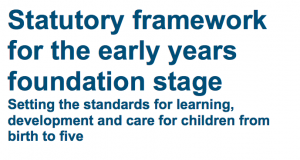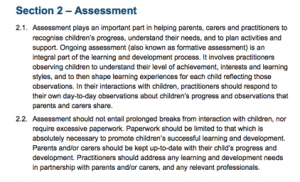As a busy early years practitioner, we know how difficult it can be sometimes to find the time to familiarise yourself with Ofsted’s requirements, especially when it comes to the new Education Inspection Framework (EIF). But don’t fret – we’re here to support you the best we can. That’s why we’ve asked early years expert and former Ofsted Inspector Hilary Preece, to share with us her tips and ‘best practice’ on using digital technology in your early years childcare setting, within the context of the new Education Inspection Framework (effective from September 2019).
There is no doubt that digital technology is an integral part of modern life and features in almost every workplace. Whether you work as a childminder in your own home or as a manager or early years practitioner in a childcare setting, the chances are you use technology in some shape or form. Kinderly Together, for example, offers an efficient, easy-to-use system for managing everything from registers and daily diaries to observations, progress reports and cohort tracking.
While this brings many benefits, you may have some concerns about how to share your digital records and what is considered best practice at an inspection in light of Ofsted’s fresh approach to gathering evidence. Ofsted’s ‘Early years inspection handbook for Ofsted registered provision’ (50-51. p14-15) sets out how inspectors will gather evidence about the quality of care, teaching and learning largely through observing children at play and discussions with the childminder or practitioner. It adds that ‘inspectors do not expect to see documentation other than that set out in the EYFS’ (62.).
Even though the message from Ofsted is that they want to reduce the amount of time spent on tracking children’s progress, ongoing assessment is still an integral part of the learning and development process – see below. The Early Years Foundation Stage was never intended for practitioners to keep masses of data or paperwork. But it does require you to observe children, keep parent’s up-to-date with their child’s progress and development, and address any learning and development needs.


The straightforward answer to this question is ‘yes’! Any system that supports your efficiency, saves time, reduces paperwork and is environmentally sustainable must be a good thing. Ofsted will neither approve nor disapprove of any chosen method or approach as long as you can demonstrate you meet the legal requirements of the EYFS and any other relevant legislation. The important factors are being able to access required electronic data during an inspection and being able to explain how you use systems and data to meet legal requirements.
For example, inspectors are most likely to ask for evidence of how your record children’s attendance, accidents and incidents to ensure you meet safeguarding and welfare requirements. You may record children’s attendance on Kinderly Together’s ‘Register’ but keep paper records for your accidents and incidents. Paper records can be easily shared with an inspector but it should be equally straightforward to use your mobile, tablet or laptop to demonstrate quickly how you use the register for recording children’s attendance accurately.
Digital technology, such as Kinderly Together’s learning journals, should still be viewed as valuable tools of your trade, even under the new Ofsted framework. The system facilitates quick and easy ways to record your observations and photos of children playing and learning. It enables you to reflect on how the observations link to the EYFS development statements and characteristics of effective learning to help realise the significance of what has been observed and to plan for children’s next steps. It also provides an option to link observations with schemas and Leuven scales for wellbeing and involvement, which may influence how you plan and adapt future activities and routines. Tracking reports can rapidly be produced to show the progress of individuals and groups of children over time and identify where there are gaps in learning. These are very valid reasons for using digital technology, regardless of whether or not Ofsted examines the data.
Furthermore, many of the features of Kinderly Together facilitate effective information-sharing and communication with parents:
So, this platform in itself is evidence of effective partnership working which Ofsted will still want to see.
Found this article interesting? Watch Hilary’s overview of what’s staying the same in the new Education Inspection Framework.

About Hilary – Former Ofsted Inspector and Early Years Consultant
Hilary is an experienced and successful early years professional having worked in the early years sector for 20 years with over 14 years as an early years inspector with Ofsted and Prospects. Hilary has also worked in Children’s Centres as an Early Years Teaching Advisor supporting early years settings to deliver the EYFS and improve quality. She has a 1st class BA (Hons) in Early Childhood Studies as well as being a qualified NVQ. Assessor.
